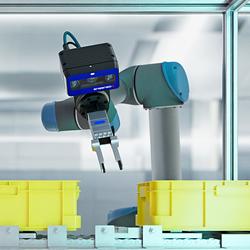Universal Robots Predicts 2023 Automation Trends Helping Manufacturers Meet New-Year Goals
.jpg)
Gone are the days of manufacturers buying a robot arm only to struggle figuring out how to integrate it in an application cell. Turnkey robotic solutions, complete with all hardware, software, sensors and interfaces, will be powerful automation drivers in 2023, according to Universal Robots:
“In 2023, cobot automation will become more sophisticated yet more straightforward to use,” predicts Joe Campbell, senior manager of applications development and strategic marketing at Universal Robots (UR). “We are going to continue seeing phenomenal growth within complete robotic systems for applications such as welding, palletizing and machine tending, propelled by UR partners creating full solutions powered by our collaborative robot arms.”
Sales of UR cobots for integration in OEM (Original Equipment Manufacturers) solutions grew about 50% in 2022. UR enters the new year with more than 80 OEM partners integrating UR cobots in turnkey systems, and over 300 UR+ partners launching application kits and components certified to work seamlessly with the UR cobots.
Cobot welders a key growth driver
A significant share of new cobot-powered turnkey systems now handle welding applications. UR’s welding channel grew over 80% in 2022 as new cobot welders hit factory floors in places such as Raymath, a sheet metal manufacturer in Ohio, where the company CEO was able to visit a local UR partner, THG Automation, offering cobot welding solutions.
“Within the four hours that I was there, we programmed 20 weld points,” says Raymath CEO, Greg LeFevre. “I was actually practicing and sampling on the parts that I was going to make. It proved to me that if I can program this in four hours and actually have my parts running, there’s no doubt this can work in our shop. I wrote the purchase order that same night.” Raymath deployed four UR cobot-powered welders, that now handle hard-to-staff processes with half the number of operators, welding at twice the speed, resulting in 4X productivity improvement.
Campbell explains that UR declared January National Cobot Awareness Month prompting more manufacturers to discover cobots. “We want to give businesses a head-start by sharing these inspiring ‘aha moments’ on how cobots can help them solve business challenges, offering them the opportunity to find a local UR partner and try a cobot firsthand,” he says.
More modular production with higher payload and longer reach cobots
As more companies move towards cobot automation, many will want to handle heavier payloads. In 2023, UR’s new UR20 cobot becomes available to customers. The UR20 is built for 20kg payloads, with faster speeds and superior motion control all within a lightweight, small footprint system. “The 20 kg payload capacity will transform industries such as palletizing, while its 1750 mm reach is eagerly anticipated for use in welding and machine tending,” says Campbell, explaining that the new robot is light enough to be unbolted and relocated or attached to a heavy base with wheels. “Modular automation is another key trend in 2023, I expect us to see more reconfigurable robotic work cells than ever before.”
Customers will be found at the heart of product development
Although UR targets robot collaboration in the workplace, human collaboration is what drives innovation. The company recently reorganized its product creation teams to focus heavily on understanding the problems customers are facing before designing solutions.
“Customers understand their own needs better than anyone else, and we will increasingly involve end-users in product development,” says Campbell, predicting that co-development projects where UR and customers work together in developing specific solutions are bound to expand in 2023 and beyond.
“Ultimately these collaborations allow customers to directly influence the product they are buying, while at the same time delivering valuable feedback – meaning we will be able to launch a product to the benefit of the whole market.”
About Universal Robots
Universal Robots aims to empower change in the way work is done using its leading-edge robotics platform. Since introducing the world’s first commercially viable collaborative robot (cobot) in 2008, UR has developed a product portfolio including the UR3e, UR5e, UR10e, UR16e and UR20, reflecting a range of reaches and payloads. Each model is supported by a wide selection of end-effectors, software, accessories and application kits in the UR+ ecosystem. This allows the cobots to be used across a wide range of industries and means that they can be redeployed across diverse tasks. The company, which is part of Teradyne Inc., is headquartered in Odense, Denmark, and has offices in the USA, Germany, France, Spain, Italy, the Czech Republic, Romania, Turkey, China, India, Japan, South Korea, Singapore and Mexico. Universal Robots has installed over 50,000 cobots worldwide.
For more information, please visit www.universal-robots.com or read our blog at blog.universal-robots.com.
Comments (0)
This post does not have any comments. Be the first to leave a comment below.
Featured Product

